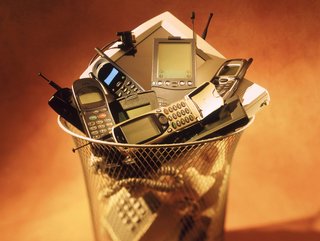Recycle Week 2022: Top 5 mobile e-waste misconceptions

This year’s Recycle Week takes place from 17th to 23rd of October.
The e-waste crisis is one of the world’s largest sustainability concerns. And, with a growing population and rapidly evolving technology, it’s an issue that’s set to get worse before it gets better.
The average person replaces their mobile phone once every 2-3 years, which generates more than 50mn tonnes of e-waste globally.
But, currently, only 20% of this is recycled.
So, to mark this year’s Recycle Week, the mobile recycling specialists at Envirofone have busted five of the most common myths about recycling e-waste.
5. E-waste can be put in regular bins
Unfortunately, this is wishful thinking. Your local council won’t separate your e-waste for you with a giant magnet. Everything you stick in that black bag will go straight into the landfill.
What’s more, mobile phones can actually pose a serious safety risk, if discarded alongside the rest of your household waste.
When your phone starts to erode and decay in a landfill, all the toxic minerals used to make the battery, microchips, and wires seep into the ground.
4. Recycling e-waste is a data risk
Taking just a few moments to ensure that all sensitive information is cleared from your device can eliminate the risk of your data being stolen post-collection.
Several apps and a variety of stand-alone software can be used for data wiping, which will make your information wholly irretrievable or at least unusable after it’s sent for recycling.
3. Keeping old devices in your desk drawer or stored away is harmless
It’s easy to presume that hoarding your electronics is the best solution.
After all, it seems to be less threatening to the environment than dumping your used electronics into the trash, and they are less likely to end up shipped to a developing country where they could cause even more harm.
However, the rare and valuable materials contained in electronics are essential within the economy of the recycling industry.
More importantly, they could help wean industries off less environmentally sound recovery processes like mining and fracking.
2. Landfills are so vast that small devices won’t make a difference
The hazardous contents of electronics, such as mercury and lead, can leak, leach and seep into the air and soil, leading to serious environmental and health issues.
Hazardous substances may also eventually find a way to seep into groundwater, causing even more risks to public health.
1. Getting rid of e-waste is a hassle
E-waste disposal is simple, provided you take the time to research and find a reliable company to help you recycle e-waste effortlessly.
There are simple steps that each organisation or individual can take to ensure you’re doing your part to meet your sustainability goals and reduce your liability.
You may not think that your old technology is worth an awful lot, however you may be pleasantly surprised. By providing a few simple details to a tech recycling specialist, your unwanted devices can be refurbished, recycled or otherwise reused, in a way that has the minimum environmental impact.






